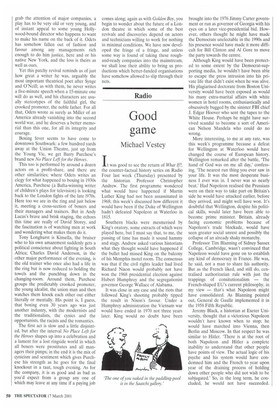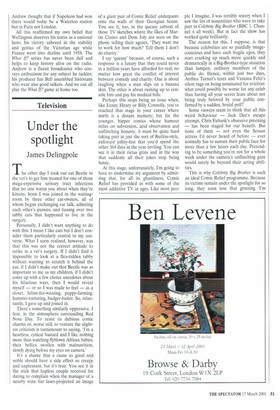Good game
Michael Vestey
It was good to see the return of What Ig the counter-factual history series on Radio Four last week (Thursday) presented by the historian Professor Christopher Andrew. The first programme wondered what would have happened if Martin Luther King had not been assassinated in 1968; this week's discussed how different it would have been if the Duke of Wellington hadn't defeated Napoleon at Waterloo in 1815.
Southern blacks were mesmerised by King's oratory, some extracts of which were played here, but I must say that, to me, the passing of time has made it sound hammy and stagy. Andrew asked various historians what they thought would have happened if the bullet had missed King on the balcony of his Memphis motel room. The consensus was that if the civil rights leader had lived Richard Nixon would probably not have won the 1968 presidential election against Hubert Humphrey and the segregationist governor George Wallace of Alabama.
It was close in any case and the riots that followed King's shooting probably tipped the result in Nixon's favour. Under a Humphrey administration the Vietnam war would have ended in 1970 not three years later. King would no doubt have been brought into the 1976 Jimmy Carter government or run as governor of Georgia with his eyes on a later vice-presidential bid. However, others thought he might have made the Democrats unelectable in the 1990s and his presence would have made it more difficult for Bill Clinton and Al Gore to move the party towards the centre.
Although King would have been protected to some extent by the Democrat-supporting media, he wouldn't have been able to escape the press intrusion into his private life that didn't exist when he was alive. His plagiarised doctorate from Boston University would have been exposed as would his many extra-marital affairs with white women in hotel rooms, enthusiastically and obsessively bugged by the sinister FBI chief J. Edgar Hoover who sent the tapes to the White House. Perhaps he might have survived scandal to become a sort of American Nelson Mandela who could do no wrong.
More interesting, to me at any rate, was this week's programme because a defeat for Wellington at Waterloo would have changed the course of European history. Wellington remarked after the battle, 'The hand of God was on me all day,' confessing. 'The nearest run thing you ever saw in your life. It was the most desperate business I ever was in. I never was so nearly beat.' Had Napoleon realised the Prussians were on their way to take part on Britain's side he would have attacked earlier, before they arrived, and might well have won. It's doubtful that Wellington, despite his political skills, would later have been able to become prime minister. Britain, already facing economic problems because of Napoleon's trade blockade, would have seen greater social unrest and possibly the collapse of an already shaky monarchy.
Professor Tim Blanning of Sidney Sussex College, Cambridge, wasn't convinced that Napoleon would have gone on to establish any kind of democracy in France. He was, he said, not a man to share his authority. But as the French liked, and still do, centralised authoritarian rule with just the trappings of consitutionalism — the French-shaped EU's current philosophy, in my view — that's what Napoleon might have consolidated. As Blanning pointed out, General de Gaulle implemented it in the 1958 Fifth Republic.
Jeremy Black, a historian at Exeter University, thought that a victorious Napoleon wouldn't have known when to stop; he would have marched into Vienna, then Berlin and Moscow. In that respect he was similar to Hitler. 'There is at the root of both Napoleon and Hitler a complete inability to understand that other people have points of view. The actual logic of his psyche and his system would have condemned him and the French to year upon year of the draining process of holding down other people who did not wish to be subjugated.' So, in the long term, he concluded, he would not have succeeded.
Andrew thought that if Napoleon had won there would today be a Waterloo station but in Paris not London.
All this reaffirmed my own belief that Wellington deserves his status as a national hero; his victory ushered in the stability and genius of the Victorian age while France went into decline until 1958. The What If? series has never been dull and helps to keep history alive on the radio. Andrew is a fluent broadcaster who conveys enthusiasm for any subject he tackles; his producer Ian Bell assembled historians who were also good talkers. And we can all play the What If? game at home too.



































































 Previous page
Previous page